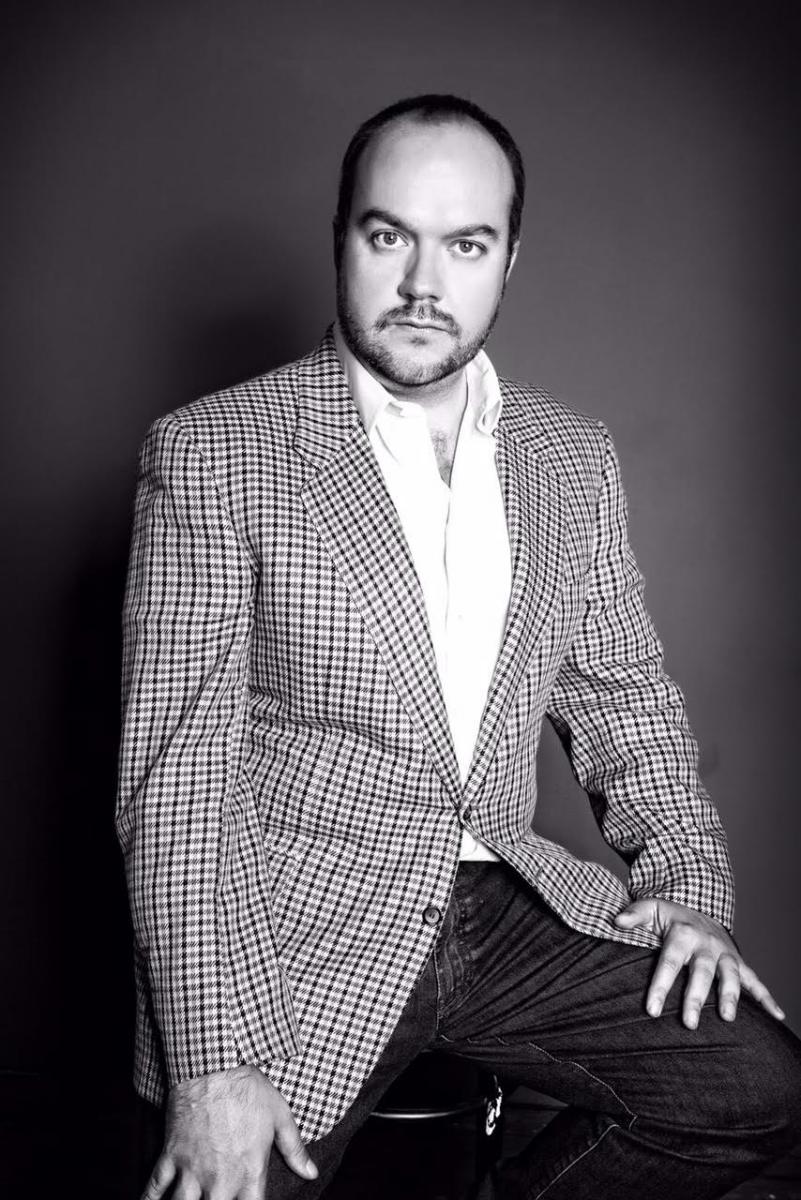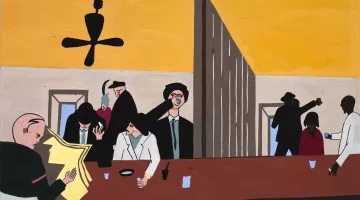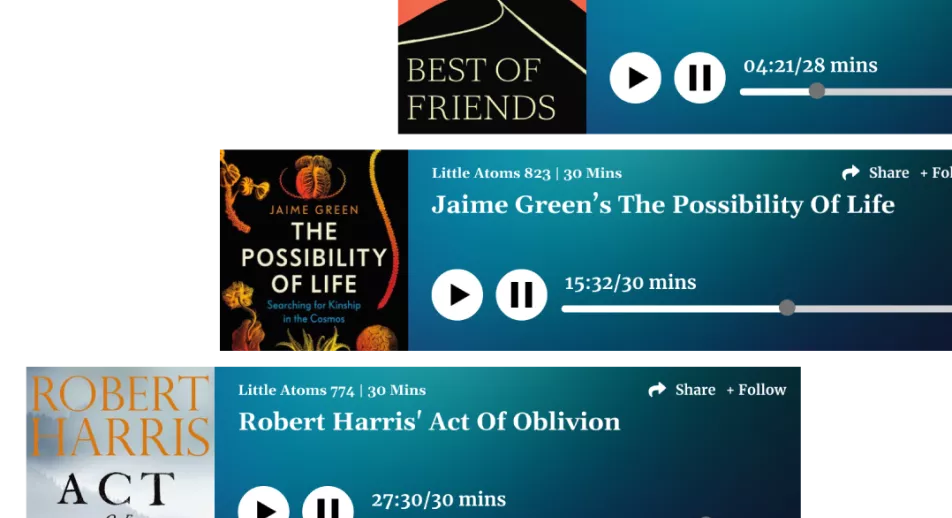Straight outta Romford: Britain’s hard-man movie scene
Tales of tax breaks and titillation

It’s 8pm in one of Soho’s swankiest hotels and the party is picking up. The event is a preview screening for Bonded By Blood 2, the latest in a long line of independent films inspired by a bloody feud between Essex drug-dealers in the 1990s.
In the hotel lobby, men in shiny suits and taut waistcoats clink glasses with women in glamorous dresses and deathtrap heels. If the faces look familiar it’s no coincidence. This is, after all, a film premiere, and the producers have done all they can to ensure a strong showing of the good and great. But while your average red carpet-do attracts the kind of stars who would stop traffic from Seattle to Seoul, tonight’s guestlist is a little more modest.
Most of the guests invited to the screening made their name through one particular vehicle: reality television. There are invitees from The Only Way is Essex, Geordie Shore and other regional variants, alongside Ex on the Beach and My Big Fat Gypsy Wedding. On the way in a promoter hands me a “spotters sheet” with photos of the priority guests – row upon row of pouting headshots; a kind of Guess Who for the Snapchat generation.
But while autograph hunters might be underwhelmed, the producers of Bonded By Blood 2 know exactly what they’re doing. Their guests have been chosen because of the clout they hold with the film’s target audience. Most have heaving social media followings and an uncanny knack for generating gossip stories. Some of them – those with the biggest promotional muscle – even get invited to star in the films themselves.
Bonded By Blood 2 marks the acting debut of Casey Batchelor: a glamour model who probably chalks up more Google searches than the rest of the cast put together. For a film with a shoestring budget – well short of the resources needed for the typical promotional campaign – it’s a cheap and quick way to get the message out there.
***
Over the past 10 years, the British film industry has seen an explosion of these films: straight-to-DVD gangster movies, sold in provincial supermarkets to bored dads and grounded teenager. Driven by technology which makes it cheaper and easier to make a homemade film – and sustained by an interest in all things violent and dangerous – more than 20 of them have hit the shelves in the past three years; most of them produced by the same small circle of insiders.
These cheap capers exist largely for one reason: they make money. Through shrewd marketing and a tried-and-tested business model, they can outsell their mega-budget competitors, often enjoying two years of supermarket shelf-life. Made for less than £100k, they are rumoured to turn a five-fold profit, making a tidy return for well-heeled investors who already benefit from generous tax incentives.
Most of the films follow a predictable pattern. Set in London or Essex, they simultaneously borrow from and contribute to the bubble of gangster folklore beloved by local hard men in village pubs. Their plots are simple; hackneyed tales of heists and hooligans, tooled-up enforcers, and old-school grandees for whom gentleman is more than just a world on a toilet door.

The dialogue oozes fucks and pricks at every turn, as characters seek to uphold an ancient honour code based on respect and the need to remedy that which is judged bang out of order. Like their audiences, the films are male-dominated. Women – when they do feature – exist to tease and titillate, or weep at the graveside of some befallen rogue. These films don’t exactly fail the Bechdel test as much as draw a large appendage on the test paper and jeer defiantly at the examiner.
It is a self-contained and self-perpetuating industry, with successful titles spawning sequels or full-on sagas. The same faces crop up over and again, both in terms of characters and the actors themselves. Many of the big names rub shoulders with the real criminals whose stories inspired the films. But for all its success, it remains an industry largely unknown to those outside of a small bubble. It is – in the words of one veteran filmmaker – the Essex Bollywood.
***
Speak to anyone who knows anything about this world and one name will inevitably come up: Jonathan Sothcott. There’s a particular filming technique, popularised by Guy Ritchie, which has become cliched in this market – the freeze-frame introduction. If this were a gangster film, Sothcott would be the first face in the spotlight, as the mythologising cockney voiceover begins.

Over the past five years, Sothcott has produced dozens of these imitation gangster films. As producer, he has to come up with the initial idea and get the film greenlit. From there, he secures pre-financing, hires the director and crew, and oversees the production. Oh, and often in less than nine months from beginning to end.
For a man who makes a living from tales of football hooligans and underworld bigwigs, Sothcott isn’t what you’d expect. Broad-shouldered and baritone-voiced, when Little Atoms meets him he’s dressed like a Pinter villain in a thick pinstripe suit and polished brogues. A 37-year-old B-movie fanatic, he began his career as Head of Programing for the now defunct Horror Channel, a niche cable venture specialising in back-catalogue vampire movies.
Danny Dyer had to be as visible as possible; and the use of weapons was to be encouraged
In the mid 2000s, Sothcott decided he wanted to produce his own films. After a few initial outings, he began to work with a network of boutique production companies which had sprung up across Soho in the wake of the new British film boom. At the centre of the web was Revolver, a punchy young distributor which had enjoyed success with a new wave of laddish gangster capers.
Part Carry On, part A Clockwork Orange, these films took the testosterone-laden gangster model and applied a lick of British silliness. Their biggest hit – The Football Factory – shifted nearly a million DVDs within a year of its release, becoming the surprise hit of 2004. Its big star was a young British actor called Danny Dyer.
Upon seeing the sales figures, champagne corks began to pop across Soho. Shiny-shoed executives became increasingly convinced in Dyer’s potential as the most bankable actor in Britain; a man whose cocky smirk and curled lip could have DVDs flying from the shelves across the country. Dyer quickly became synonymous with this new wave of British bruisers; a man whose presence alone was a badge of quality for his male fanbase – an Adam Sandler for the lads’ mag market.
Sothcott recounts how film companies began investing heavily in new Dyer vehicles. Then one company – Metrodome – had an idea. They decided to buy the distribution rights to Dyer’s back catalogue and flog them to his new market. The problem was, though, that most of these films were nothing like The Football Factory – the film Borstal Boy, for example, was actually a touching gay drama, based on the autobiographical book by Irish playwright Brendan Behan that just happened to be set against a prison backdrop.


According to Sothcott, greedy distributors became convinced that they could paper over the cracks with creative tweaks. They introduced a strict house style for the film covers, designed to profit through association with The Football Factory. The cover must be red-and-black; Danny Dyer had to be as visible as possible; and the use of weapons was to be encouraged – even if they weren’t central to the plot.
It became the stuff of parody: a naff rom-com was marketed as an urban thriller, with an image of Dyer holding a gun. Sothcott himself was involved in one experiment where two separate covers were produced for the film Just for the Record, a mockumentary about the British entertainment industry. One of the covers was the original design; the other used an image of a snarling Dyer more suited to an urban punch-up.
In 2013, Revolver went bust, having pushed its sleight-of-hand marketing model to its limits. Customers had become disenchanted with Danny Dyer, having been tricked into buying films that were of no interest to them. Furthermore, Dyer’s own reputation had been trashed, following the publication of a poorly-judged magazine column in which he encouraged a spurned lover to “cut his ex’s face” so no-one would want her anymore.
The common wisdom was that Dyer’s credibility was blown for good – but Sothcott wasn’t convinced. Having met Dyer at an industry party some years previously, Sothcott decided to approach him with his own offer. Sothcott had been offered a script for a stripped-back but intelligent revenge film called Vendetta. The aim was to produce a low-budget but quality film which would bring Dyer’s original audience back onside. Feeling optimistic, Sothcott offered to finance the film himself.
Vendetta went on to be another DVD success, even attracting mild critical acclaim. To this day it remains one of Dyer’s favourite films from his expansive back catalogue. Now Sothcott has his own company – Hereford Films – and has produced more than more than a dozen films since Vendetta, several starring Dyer himself. In fact, since Danny Dyer’s lucrative transfer to Eastenders, Sothcott has begun working with his 21-year old daughter – Dani Dyer.
If your average Tom Hardy film is a steak, my films are a McDonald’s
While insisting he has learnt from the hubris of his predecessors, Sothcott remains bullish about his own work. When comparing himself to one of his main competitors (the rave-promoter turned screen hard-man Terry Stone), he quips convincingly that “Terry makes better films, but I make more of them.” He is – as you might expect – a staunch defender of the product, quick to palm of the scorn of snooty and snobbish critics.
“If your average Tom Hardy film is a decent steak dinner, my films are a McDonalds take-away,” he tells me. “They might be cheaper and not as flashy, but – as anyone will tell you – sometimes a McDonald’s hits the spot better than a proper restaurant.”
He is unapologetic in his anti-snobbery – Sothcott makes films for white van-men and weekend dads; the kind of men who feel ignored by the mainstream studios. But for all his egalitarian claims, he enjoys a more full-blooded lifestyle. His Twitter feed is replete with celebrity parties and business class jets to LA. When I put this to him, he is bashful (“that’s just my private life”), insisting there is no contradiction between goading Mark Kermode for being out-of-touch (a favourite pastime of Dyer super-fans) before going on to lunch at the Groucho.
He remains sensitive, too, to the suggestion that he has become the gateway for reality television starlets looking for big screen action. “I can’t work with just anyone,“ he says. “Casey Batchelor is a trained actress.” And for what it’s worth, nothing in Bonded By Blood 2 suggests otherwise.
One filmmaker complained about having to rewrite a crucial scene after two aspiring glamour models failed to turn up for shooting
For those who actually make the films – usually over-worked directors – it’s a different story. One filmmaker complained about having to rewrite a crucial scene after two aspiring glamour models failed to turn up for the second day of shooting. Others mentioned tabloid photographers turning up on set to sneak candid shots of the talent; while the producers denied colluding with the paparazzi, the director pointed out the improbability of them turning up in such a remote location. That and the fact that the film got a decent plug in the article.
Whatever the truth, there is no doubt that Sothcott is well connected in these worlds. His Hereford Films business partner – Damien Morley – has a lucrative sideline as an agent for glamour models through his own agency, Girl Management (formerly Morr Girls). Then there’s the fact that celebrities themselves seem keen to get hold of him – last year he was approached by the feminist baiting comedian Dapper Laughs, who said he had an idea for a film.
“I know Dapper’s work, so my hunch was that it was a good idea and it would make money, but I just felt I wasn’t the right person to make it,” he says. “I don’t get Snapchat and all that malarkey, so I passed it on a friend of mine who ended up producing it.”
***
There is, of course, one big variable in Hereford’s business model: the cost of making the films in the first place. Sales of their films might be viable, but they are not astronomical. Anything above 50,000 is seen as successful, leaving the challenge of making a film that’s cheap enough to be profitable.
Greg Hall – who directed Bonded By Blood 2 – knows all about that. This is the second time he’s made a film for Sothcott. Like Sothcott, he came to the industry through a different route, having studied as an art-house filmmaker. In 2006, he produced his debut full-length film, The Plague, on a budget of less than £5,000, which garnered the acclaim of Mike Leigh. After screening his film at a number of independent festivals, he was contacted by a friend with a different offer: an embryonic project called Dangerous Mind of a Hooligan.
Embryonic is perhaps overselling it. At the time, the film was nothing more than a concept poster. This is how the typical low-budget gangster film gets commissioned: someone mocks up a title and some DVD artwork and takes it to a distribution company which specialises in direct DVD sales. That company then makes a gut decision as to whether to put up cash to fund the project in advance.
Greg was handed a script and given four months to make the film – a fraction of the time he was used to. With a team of friends, he worked twelve hour days, subsiding on supermarket sandwiches and adrenaline, and travelling home on the night-bus. The line from the producers was that all unnecessary expenses should be avoided.
For City grandees and wannabe plutocrats, investing in cheap, poor quality films has become a convenient way to pay less tax
There are tricks to keep the costs down. Most of the locations used – smoke-filled nightclubs and old-fashioned boozers – are provided free-of-charge by landlords who want to see their establishment on screen. Directors often recruit friends and relatives to make up the numbers in busy fight-scenes.
Others come up with creative ways to accommodate the producers’ demands. Take Chris Bell, a part-time fireman with the honour of having directed two of the cheapest films in the industry. In 2013, he made his first film – out of his own pocket – for less than £10,000. Titled Three Steps Down from Plaistow, it was a gritty drama about two friends who grow up to find themselves on opposite sides of an organised crime feud. He uploaded the film – most of which had been shot on handycam without editing – to YouTube.
Two years later, he was contacted by a producer who had secured a lucrative commission for a film called Hooligans at War: North Vs South. As often happens in the industry, the producer had no script or storyline beyond his initial idea of a hooligan/military crossover, but had managed to blag pre-financing. The producer – Simon Phillips – had seen Three Steps online and wondered if Chris would be interested in re-jigging the project and turning it into a longer film which would meet the distributors’ requirements.
There were, however, two problems – and they were both in the title. The final film needed to feature football hooligans, and it had to include armed conflict. The producer handed Chris an extra £10,000 in order to shoot a new preamble to the film, incorporating a thirty-man brawl between football hooligans. The scene is rushed, amateur and unreferenced again until the end of the film.
For the military scenes, he had to be more creative. Unable to stump up the cash for anything exotic, he filmed the scenes in a local woodland. These were intended to be flashback scenes, showing the two lead characters serving together in Bosnia. “To be honest, I had no idea where Bosnia even was,” he laughs. “I just figured it was more plausible than Iraq or Afghanistan.”
Finally, if all else fails, the producers can top up the budget with additional funding from private investors. Since 2012, the low budget film industry has made heavy use of a new finance vehicle called Seed Enterprise Investment Scheme (SEIS) designed to persuade people to put their money into the creative industries. The scheme is extremely generous: investors can redeem 50 per cent of their contribution against their income tax bill (invest £10,000 and pay £5,000 less tax); higher rate taxpayers can recover a further 40 per cent if the company is wound up. For City grandees and wannabe plutocrats, the world of poor quality films has become a convenient way to pay less tax.
To sweeten the deal, a cunning producer can offer extra – non-financial – incentives. Some years ago, Metrodome stumbled across the idea of giving investors a role in their films. While insisting he doesn’t do vanity projects, Sothcott admits to casting investors (and their girlfriends) in walk-on parts. Some are keen to make a name for themselves (particularly if they blag a co-production credit), while others have stranger motivations. Some years ago, the tabloid-baiting lottery winner Michael Carroll coughed up £20,000 to feature in a torture scene with Danny Dyer – perhaps not the kind of “bankability”, Metrodome had originally in mind.
***
Back in Soho, the lights dim for the start of Bonded By Blood 2. As the credits roll by, the audience cheers the familiar names – this is a small world and most of those credited are in the room tonight. The film is a solid effort: the storyline – whilst dripping with testosterone – stays on the right side of cliche. The directing itself is slick, full of Trainspotting-esque cuts and trendy edits.
The day after the party, the film gets a plug on the Daily Mail, the most viewed website in the UK – albeit in an indirect way. The story itself is about Carla Howe, the British Playboy model whose skimpy outfit at the launch party inspires a 200 word write-up on Mail Online. Casey Batchelor, as it happened, never made it to the launch – she did, however, manage to tweet her excitement to her 318,000 followers on Twitter.
Gauging the success of the industry is difficult to do, as producers like Sothcott are understandably coy about the numbers. What’s clear, though, is that distributors are willing to keep funding these ventures and punters are happy to keep buying them. With the overall DVD market in decline (due to the popularity of online screening services) it’s easier than before for a film like Bonded By Blood 2 to grab a space in the Tesco top 20 – which means the supermarket is obliged to keep stocking it.
Some industry insiders are more skeptical, criticising the viability and fairness of Hereford’s business model. Writers and crew-members have formed groups on Facebook insisting they haven’t been paid for work on films which completed three years ago. They say that producers routinely duck invoices as a way of keeping costs down. Others talk about a “spinning plates” business model, where pre-financing from one film is used to settle the debts from the last venture – they warn that once the money stops coming, the whole thing will collapse.
Bonded By Blood 2 made the Tesco and ASDA top 20 list. A few spots below sits the official double feature: both Bonded By Blood films for the price of a Wetherspoon’s meal-deal. Greg Hall says there are already whispers of a third film, if someone can come up with a decent script. For Sothcott, there’s no time to celebrate. His next film, We Still Die the Old Way – the final part of a trilogy about a motley crew of East End bruisers returning from their retirement for one last job – begins filming soon. As ever, the clock is ticking.




